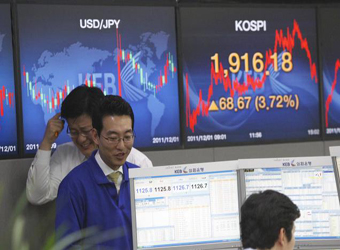Asian stocks outside Japan fell as investors await the conclusion tomorrow of a meeting ofChina’s leaders on economic reform. Japanese equities rose after better-than-expected U.S. payrolls data weakened the yen.
Robinsons Retail Holdings Inc., an operator of supermarkets and department stores controlled by billionaire John Gokongwei, slumped 5.4 percent on its trading debut following the largest Philippine initial public offering. Nexon Co., a maker of online games, plunged 22 percent inTokyo after its net-income forecast missed estimates. Honda Motor Co., a Japanese carmaker that gets 47 percent of its revenue in North America, added 1.7 percent.
The MSCI Asia Pacific excluding Japan Index lost 0.5 percent to 467.63 as of 12:56 p.m. in Hong Kong. The MSCI Asia Pacific Index, which includes Japanese shares, was little changed at 139 after closing on Nov. 8 at the lowest level since Oct. 8. Chinese President Xi Jinping and Communist leaders tomorrow conclude a four-day gathering.
“People are waiting for the announcement to come out and how authorities intend to fund new projects or do new reforms,” said Khiem Do, Hong Kong-based head of Asian multi-asset strategy at Baring Asset Management Ltd., which manages about $51 billion. “I think investors are saying, ‘OK, I’ll lock in some profits and may come back’.”
The Asia-Pacific gauge climbed the past two months, pushing valuations on the measure to 13.5 times estimated earnings as of Nov. 8, up from a multiple of 12.7 at the end of August, according to data compiled by Bloomberg. That compares with a current multiple of 16 for the Standard & Poor’s 500 Index and 15 for the Stoxx Europe 600 Index.
Regional Gauges
Japan’s Topix index rallied 0.6 percent after the yen fell 1 percent versus the dollar on Nov. 8, the most since Sept. 19. Japan’s current account surplus grew 14.3 percent from a year earlier to 587 billion yen, a report showed today.
The Philippine Stock Exchange PSEi Index (PCOMP) slumped 1.8 percent, heading for the biggest loss since Sept. 30, after Super Typhoon Haiyan killed as many as 10,000 people and flooded islands. Australia’s S&P/ASX 200 Index fell 0.4 percent as data showed the nation’s home-loan approvals grew in September by more than expected. New Zealand’s NZX 50 Index slipped 0.6 percent and South Korea’s Kospi index lost 0.4 percent.
Hong Kong’s Hang Seng Index (HSI) rose 0.1 percent and China’s Shanghai Composite Index dropped 0.2 percent. Taiwan’s Taiex Index slid 0.7 percent, while Singapore’s Straits Times Index added 0.2 percent.
U.S. Jobs
Futures on the S&P 500 lost 0.1 percent after the measure jumped 1.3 percent on Nov. 8. American employers added 204,000 workers last month after a revised 163,000 gain in September that was larger than previously estimated, Labor Department figures showed Nov. 8. The increase in payrolls topped the most optimistic forecast in a survey of economists.
The Federal Reserve said it needs to see more evidence of sustained economic improvement before slowing its $85 billion of monthly asset purchases. Economists predict the central bank will maintain bond purchases at the current pace until March, according to a Bloomberg survey conducted Nov. 8. Policy makers next meet on Dec. 17-18.
“Markets are going to be worried about how quickly the U.S. is going to start removing some of its stimulus program, but I think overall economic data is supportive of equity markets,” said Stephen Halmarick, Sydney-based head of investment markets research at Colonial First State Global Asset Management, which oversees about $160 billion.
China’s industrial output rose a more-than-estimated 10.3 percent from a year earlier in October, according to data released Nov 9. by the National Bureau of Statistics. October inflation was a less-than-forecast 3.2 percent, producer prices fell 1.5 percent from a year earlier and retail sales rose 13.3 percent.
Source: Bloomberg



